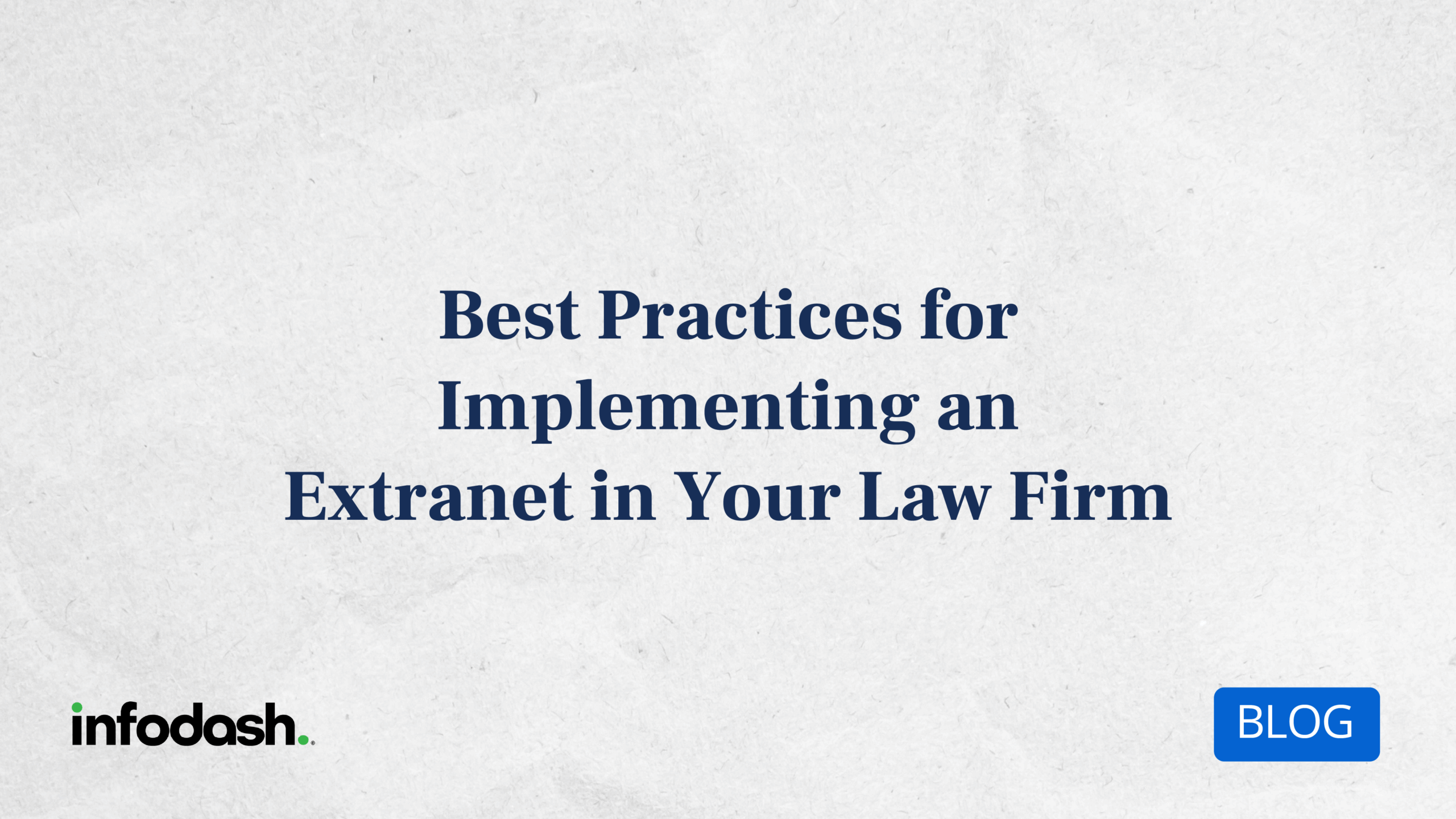Best Practices for Implementing an Extranet in Your Law Firm

Deploying an extranet within your firm creates a secure, collaborative environment that enhances client engagement and strengthens matter management. Infodash’s extranet, built directly within Microsoft 365, offers law firms a secure and efficient way to share documents, communicate with clients, and enforce governance policies without adding new platforms or logins. Below are six proven strategies to ensure a smooth, compliant, and firm-aligned implementation.
1. Establish Clear Objectives and Use Cases
Before implementation, define specific business goals and determine how the extranet will support firm priorities and client expectations.
Key Considerations:
- Identify high-value use cases such as client collaboration, document exchange, or matter tracking.
- Align on measurable outcomes, including reduced email volume, improved compliance, or faster turnaround on client requests.
- Ensure leadership, IT, and practice groups agree on scope and long-term purpose.
Why It Matters:
A focused rollout aligns the extranet with operational needs and sets a foundation for measurable success.
2. Leverage Native Microsoft 365 Integration
Infodash’s extranet runs directly within Microsoft 365, using your existing identity management, security policies, and collaboration tools.
Best Practices:
- Use Microsoft Teams for direct, real-time engagement with clients.
- Automate site creation and archiving to maintain lifecycle governance.
- Apply built-in Microsoft 365 security tools like multi-factor authentication and encryption.
Why It Matters:
Native integration eliminates platform sprawl, drives adoption, and enforces consistent security standards across internal and external users.
3. Configure the Extranet Around Firm and Client Needs
No two firms operate the same way. Configurability is essential to reflect your practice areas, client expectations, and internal workflows.
Configuration Tips:
- Apply firm-specific metadata for organizing files by matter, client, or document type.
- Build client-specific dashboards that reflect their key priorities.
- Set role-based access to restrict content appropriately.
- Standardize workflows with templates that mirror your internal processes.
Why It Matters:
A tailored experience improves usability, reinforces brand consistency, and keeps clients focused on what matters most.
4. Enforce Security, Governance, and Compliance by Design
Law firms must manage sensitive information with precision. Governance cannot be an afterthought.
Security Practices:
- Enable auditing, reporting, and user lifecycle controls to track who has access to what, and when.
- Apply granular permissions to limit exposure of confidential materials.
- Maintain detailed audit logs for defensible compliance.
- Use automated prompts and workflows to guide users in following firm policies.
Why It Matters:
A well-governed extranet reduces risk, improves audit readiness, and demonstrates the firm’s commitment to data protection.
5. Train Users and Provide Ongoing Support
A successful deployment requires buy-in across attorneys, staff, and clients. Enable adoption through training and thoughtful support.
Training Approaches:
- Offer structured sessions for legal professionals to introduce extranet functionality.
- Provide clients with step-by-step guidance and quick reference materials.
- Embed help tools and in-platform prompts to reduce support requests.
- Communicate clear benefits tied to specific workflows, not just features.
Why It Matters:
When users understand how the extranet supports their daily tasks, adoption rises and support burdens decrease.
6. Monitor, Refine, and Evolve
Implementation is only the beginning. Ongoing optimization ensures continued alignment with firm priorities and regulatory requirements.
Ongoing Optimization:
- Use Microsoft 365 analytics to track user engagement and identify usage trends.
- Solicit feedback from attorneys and clients to improve usability.
- Adjust roles, permissions, and configurations to reflect organizational changes.
- Update integrations and security settings regularly to maintain compliance.
Why It Matters:
An extranet that evolves with your firm ensures continued value, improved performance, and reduced operational friction.
Conclusion
Infodash’s Microsoft 365-native extranet gives law firms the tools to collaborate securely, serve clients more effectively, and enforce governance across all external interactions. A thoughtful, goal-driven implementation ensures your platform delivers long-term value to both your teams and your clients.
Interested in seeing how Infodash supports secure client collaboration? Schedule a demo today.
Subscribe for Updates


